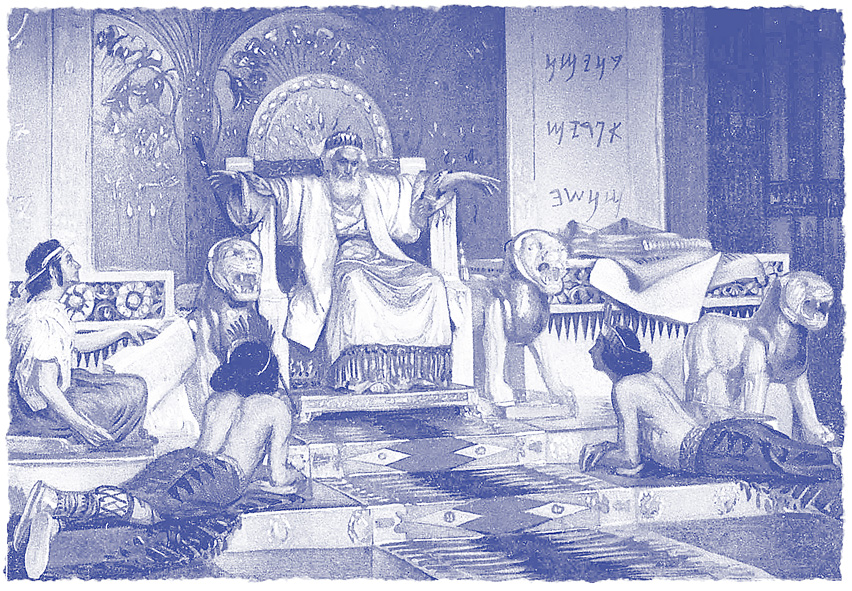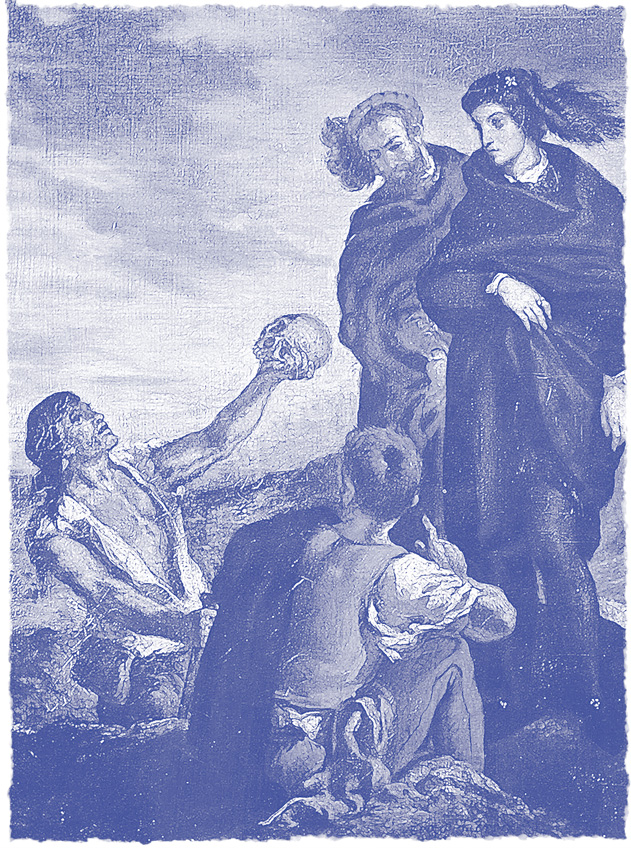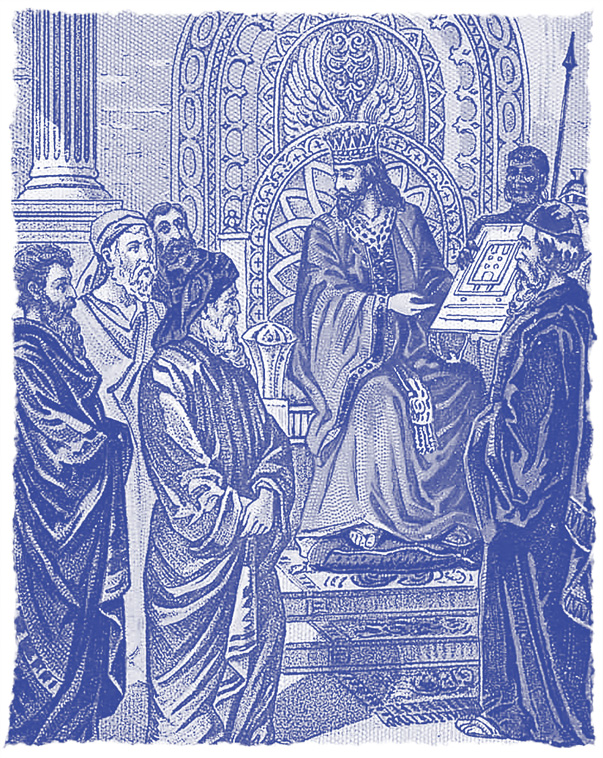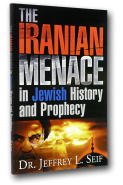
Dear Ministry Partner,
Shalom and, since the January issue of this letter to you featured Mark Levitt’s State of the Ministry report, a belated Happy New Year! It’s always exciting to anticipate new beginnings, set new goals, and look forward to God’s blessings. Yet, a new year also brings challenges to overcome and mysteries of life that leave us wondering how we can get through the tough stuff.
I like the Living Bible’s translation of Galatians 6:9,
“And let us not get tired of doing what is right, for after a while we will reap a harvest of blessing if we don’t get discouraged and give up.”
If King Solomon had etched that verse in stone in his throne room, he might have been less depressed when he wrote Ecclesiastes. But, then, we would not have insights into his philosophy of life and the precepts we can learn from his experience.

You may have guessed that our Bible study for the next few months will focus on the Old Testament (Old Covenant) Book of Ecclesiastes. Examining the futility of life may seem a counterproductive way to begin the new year, but the overarching theme of Ecclesiastes is really “the futility of life without God.” Solomon paints a clear picture of that lifestyle with his unique and ironic writing style.
We will accept the Jewish tradition that Solomon, King David’s son, authored Ecclesiastes, even though Solomon’s name is never mentioned. Instead, Solomon refers to himself as “the Preacher, the son of David, king in Jerusalem.” In fact, “Ecclesiastes” means “Preacher.” Let’s listen to the Preacher.
First, let’s jump forward to Chapter 2 where it clarifies what is going through Solomon’s mind as he pens this journal. Follow with me in your Bible at 2:17–18,
“Therefore I hated life because the work that was done under the sun was distressing to me, for all is vanity and grasping at the wind. Then I hated all my labor in which I had toiled under the sun, because I must leave it to the man who will come after me.”
This is the king of Israel expressing his despair about life. It’s hard to imagine a man who has everything — and I mean everything at his disposal with the snap of a finger — being so very distraught about life.
Before we return to Chapter 1, do you detect a recurring theme in the two verses just read? That’s right, “all is vanity — under the sun.” Keep those thoughts in mind as we walk with Solomon through his view of life … under the sun!

SOLOMON SEES LIFE AS VANITY
Ecclesiastes 1:2 expresses Solomon’s grievances in this way: “Vanity of vanities … vanity of vanities, all is vanity!” The Hebrew word havel (translated here as “vanity”) means “vapor” or “breath.” It should remind us of our study in James, where chapter 4 (March 2019) compared life to a “vapor” — it appears and then vanishes.
Why couldn’t Solomon find purpose? Remember the phrase “under the sun” from chapter 2? It should remind us of the phrase “under the circumstances,” often used as an excuse for not living life to its fullest. It reminds me of a defense repeated by the chubby, burr-headed Stooge (of The Three Stooges), Curly, who would claim, “I’m a victim of circumstance.”
If life is viewed only by what we see and the circumstances that surround us, then, yes, all is vanity, hollow, worthless. But, the life surrendered to the God of the universe brings purpose, blessing, and peace in this often brutal world. Wouldn’t you agree?
As Believers (“Believers” is short for “believers in Yeshua/Jesus as Messiah.”), you and I are not immune to the difficulties of human existence. We will go through the grist mill like anyone else on Earth. Those of you who join me in saying “amen” to all of that have a Savior who knows our needs and presents those needs to our Father in Heaven, even when we don’t know them ourselves! Consider what Paul writes in Romans 8:26,
“Likewise the Spirit also helps in our weaknesses. For we do not know what we should pray for as we ought, but the Spirit Himself makes intercession for us with groanings which cannot be uttered.”
SOLOMON LOOKS AT LIFE’S CYCLES
Now that we’re past the first couple of verses, maybe it gets happier. Um … Nope! In verse 3 Solomon questions whether it’s worth working hard and gaining possessions and wealth. What’s the point? In verse 4, he tells us that “one generation passes away and another generation comes.”

People come and people go. What’s the point of this life? Think back over the decades of your own life. In my lifetime, great leaders, entertainers, comedians, and spiritual giants have come and gone — from JFK to Billy Graham. Solomon considers it a monotonous futility. Keep the trigger phrase handy: “under the sun.”
Solomon addresses the wind and rivers in verses 6 and 7. For those of you who keep track of the weather, the continuous cycle of water — evaporated by the sun into the atmosphere and then returned in the form of rain, sleet, or snow — is a monotonous cycle according to Solomon. Life under the sun is vanity of vanities — worthlessness of worthlessness!
SIGHTS AND SOUNDS IN SOLOMON’S LIFE
The next few verses, 8–11, call attention to the eyes and ears being unfulfilled, because as verse 9 states, “there is nothing new under the sun.” The next video game, or the next advanced set of earbuds will not satisfy. It doesn’t matter what the marketing advertisements tell you, the “new” product won’t satisfy — at least not for long. The next new gadget or gimmick or educational degree or financial achievement will not satisfy. They all are “under the sun” distractions that keep us from the one commitment that will carry us through this life and into the next life! Am I asking you to give up a successful and fulfilling earthly life? Of course not; and neither is Solomon.
SOLOMON’S OVERVIEW OF LIFE UNDER THE SUN
Before Solomon introduces himself to us in verse 12, he has set the stage: things that were, or are yet to come, have no meaning for him. At the end of the day, he would rather forget about them. Have Solomon’s words got you reviewing life in general, and perhaps some areas of life specifically? Good. That is exactly his intention in recording his thoughts in this journal called Ecclesiastes.
Toward the end of chapter one, we find Solomon introducing himself (v. 12) as “I, the Preacher, have been king over Israel in Jerusalem,” and then giving a prelude to the journey he is about to take.
Here’s how the remainder of chapter one unfolds. Verses 13–15 are like the words of an explorer setting out to improve on the experience of previous explorers. That which Solomon has accomplished in his own way, and by his own strength, has proven to be nothing more than “vanity and grasping for the wind.”
Solomon completes this section (v. 17) by looking at his successes and failures — “to know madness and folly” — and compares them all to trying to grasp the wind. When God came to Solomon and asked him what he desired most, do you recall Solomon’s reply? He asked God for wisdom. 2 Chronicles 1:10, “Now give me wisdom and knowledge, that I may go out and come in before this people; for who can judge this great people of Yours?”
Nothing informs and inspires more than the voice of experience. I pray that you will walk with me through Solomon’s Ecclesiastes journal about our life on Earth, under the Sun. Together we will discover a committed life that reaches beyond the moorings of this earthly existence.

Standing firm with Israel and ZLM,

P.S. Let’s not give up on Solomon, who also wrote insightful instructions in the Book of Proverbs. One such Proverb is 1:5, “A wise man will hear and increase learning, and a man of understanding will attain wise counsel.” Sage advice for living with life’s complications in 2020! ![]()

A Note from David and Kirsten
Galatians 6:9 — the verse Tony cites in his opening — is David’s favorite Bible verse! We’re praying that you won’t get tired of doing what is right this year. Keep working at loving people into the Kingdom, and anticipate a harvest of souls finding hope and salvation in Messiah.
Tony’s teaching on King Solomon’s “famous” phrase — “There is nothing new under the sun” (Ecc. 1:9) — applies to this ministry. The change to attract new viewers to our message affects only the program’s name, not the ministry’s mission or name. Our Jewish Roots describes our teaching better than a teacher’s name does. Nothing is new under the sun, and nothing has changed about this ministry’s message.
We sincerely ask you to keep all of us ministry workers in your prayers. Personally, we urge you to offer encouragement along with any constructive criticism. ZLM receives many letters from its loyal readers and viewers … some uplifting, but a few that seem judgmental and unnecessarily harsh. It saddens us to see the Body of Christ occasionally send negative (and sometimes ugly) comments to this ministry.
If you have partnered with our ministry for any length of time, you already realize that Mark Levitt and other ministry leaders spend many hours sincerely praying for direction and guidance from the Holy Spirit. They don’t make snap decisions. What can you do to partner with us? Pray for this ministry. Financially support and be the backbone for what Zola started and his son Mark, TV producer Ken Berg, and many others behind the scenes strive to continue.

Zola Tours to the Holy Land
Zola Tours has been taking pilgrims to the Holy Land for 37 years and has never canceled a tour. And so we will continue. Tourism is on the rise in Israel — good news indeed! — meaning that people from across the world are supporting the small plot of land that God set aside for Himself. Come, walk, and explore this incredible land with us. See ancient Biblical sites, but also experience the chai (life) that flourishes throughout the land as Biblical prophecies come alive before your eyes.
For Zola Tours questions and itinerary details, please contact tour manager Sandra at 214-696-9760, email her at travel@levitt.com, or visit levitt.com/tours.

| Deluxe (Israel only) | Mar 16–26 | $5,288 |
| Grand Petra (Israel & Petra) | Mar 16–29 | $6,488 |
| Deluxe (Israel only) | Oct 19–29 | |
| Grand Petra (Israel & Petra) | Oct 19–Nov 01 | |
| Grand Athens (Greece & Israel) | Oct 13–29 | Prices to be determined. |
| Ultra Grand (Greece & Israel & Petra) | Oct 13–Nov 01 |

Our Jewish Roots programs this month
Zola was a pioneer in Christian television. Jeffrey Seif continues Zola’s legacy with up-to-date insight and wisdom. In the studio recently, we taped brand-new programs for 2020. Buckle your seatbelts — we’re off and running!
Our new Joshua: More than a Conqueror continues this month. This edifying series examines how Joshua went from a dependable apprentice to the faithful leader of Israel when Israel was conquering the land of Canaan. Dr. Jeffrey Seif offers valuable leadership lessons from corresponding Holy Land locations. Following dramatic reenactments from Joshua’s life, David and Kirsten Hart discuss the lessons’ meanings and applications with Dr. Seif.
- At Ai
- Disobedience after the victory at Jericho leads to Israel losing the second battle in conquering Canaan. In spite of failure and disappointment, Joshua shows leadership by following God’s instructions to learn from the past and focus on the future that God has planned for Israel.
- The Gibeonites
- Because of deception, Joshua’s integrity is severely tested when he faces the decision to either break his vow or keep it under false pretenses with negative long-term consequences. We, too, face deceivers determined to trick us, and we need to pray to the Lord for discernment.
- At Shiloh
- The conquest for the land of Canaan is nearing its end. The Israelites have subdued the south and turn north to put down the last vestiges of resistance. The Tabernacle of the Wilderness comes to rest in Shiloh, where it will stand for over three centuries.
- At the End
- Joshua leaves the legacy of a good soldier and leader of Israel, full of faith in God. Divine strategies exist that help us become victors and not victims as we seek to follow the Lord’s will and direction for our lives.
Our Jewish Roots is now airing Thursday afternoons on TBN — 6:30 ET, 5:30 CT, 4:30 MT, and 3:30 PT. In addition, we are delighted to introduce a second new network: TCT on Sundays — 7:00 ET, 6:00 CT, 5:00 MT, and 4:00 PT. Amen for the Lord opening up new TV times to share His Gospel!
Sha’alu shalom Yerushalayim! —
Pray for the peace of Jerusalem! — Psalm 122:6
David & Kirsten
P.S. More than ever, the world needs to hear the Gospel of Jesus Christ! Thanks to you, ZLM is expanding our television outreach to spread the salvation message and emphasize the importance of supporting Israel — especially in light of recent activities in Iran. The “Good News through the eyes of the Jews” (as Dr. Seif expresses it) will never change at Zola Levitt Ministries. We forge on until Messiah returns! ![]()

 Zola Levitt Ministries is ECFA approved and has Charity Navigator’s top rating of 4 stars.
Zola Levitt Ministries is ECFA approved and has Charity Navigator’s top rating of 4 stars.



